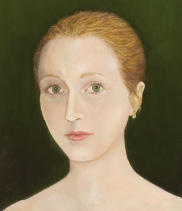The End of the Story of Little Schatzl
Katharina Gilowska was sitting up when I arrived and practically pushed me into the chair next to her bed as I reached out to take her cold hands in mine.
‘Get on with it, Nan,’ she urged without so much as a cough.
'But when it came to pass that Schatzl was almost thirty three years old, her father closed the lid of the harpsichord in a pause before an extremely difficult cadenza and said to his daughter: 'Now, all your sisters are comfortably off, middle-aged and content with their children and step-children, it is time for you to marry, Schatzl, or else you will be quite alone when I am dead.'
‘So be it,’ replied his dear, youngest child, although her voice was wavering. ‘I shall be an old and solitary maid. That is a long way from now, Papa, so do not fret about me for a minute or a week.’ In her mind, which she felt was the safest place for her more controversial thoughts, there was the comfort of a certain person who came to town on market days and who played the violin with great sensitivity. He would sell her silks and velvet from behind his stall and in her dreams, they were as one. His name was Jakob Hofmann and she did not want him to be real.
Soon after the baron's talk with Schatzie, he asked his six other daughters to try and persuade her to think again, but they too failed. There was no point to their entreaties.’
‘Really Nan, this is turning out to be a very long, sad story. When is the happiness coming?’
‘It won’t, I’m afraid, unless your idea of happiness depends upon tragedy,’ I replied.
‘O cruel, horrible Nan. You cannot keep me in a state of suspense like that. I have been ill for days and at this rate, unless you end the story soon, I will be forced to remain bedridden and depressed forever.’
‘Exactly,’ I laughed, ‘which is why there is no more to tell. The story is finished. From now on you will get better and we can resume target practice on Thursdays and I can go home to supper and a game of ecarte with Papa or Wolferl - or Mama or Miss Pimperl, the dog.’ N.
‘Get on with it, Nan,’ she urged without so much as a cough.
'But when it came to pass that Schatzl was almost thirty three years old, her father closed the lid of the harpsichord in a pause before an extremely difficult cadenza and said to his daughter: 'Now, all your sisters are comfortably off, middle-aged and content with their children and step-children, it is time for you to marry, Schatzl, or else you will be quite alone when I am dead.'
‘So be it,’ replied his dear, youngest child, although her voice was wavering. ‘I shall be an old and solitary maid. That is a long way from now, Papa, so do not fret about me for a minute or a week.’ In her mind, which she felt was the safest place for her more controversial thoughts, there was the comfort of a certain person who came to town on market days and who played the violin with great sensitivity. He would sell her silks and velvet from behind his stall and in her dreams, they were as one. His name was Jakob Hofmann and she did not want him to be real.
Soon after the baron's talk with Schatzie, he asked his six other daughters to try and persuade her to think again, but they too failed. There was no point to their entreaties.’
‘Really Nan, this is turning out to be a very long, sad story. When is the happiness coming?’
‘It won’t, I’m afraid, unless your idea of happiness depends upon tragedy,’ I replied.
‘O cruel, horrible Nan. You cannot keep me in a state of suspense like that. I have been ill for days and at this rate, unless you end the story soon, I will be forced to remain bedridden and depressed forever.’
‘Exactly,’ I laughed, ‘which is why there is no more to tell. The story is finished. From now on you will get better and we can resume target practice on Thursdays and I can go home to supper and a game of ecarte with Papa or Wolferl - or Mama or Miss Pimperl, the dog.’ N.


0 Comments:
Post a Comment
<< Home